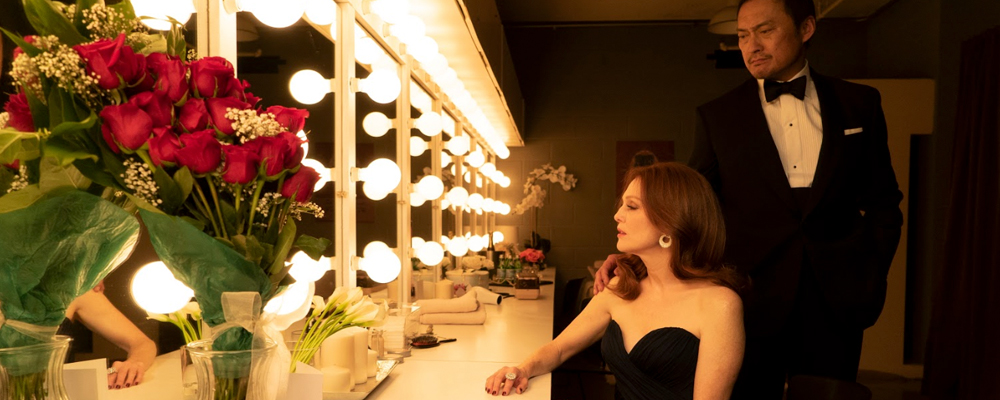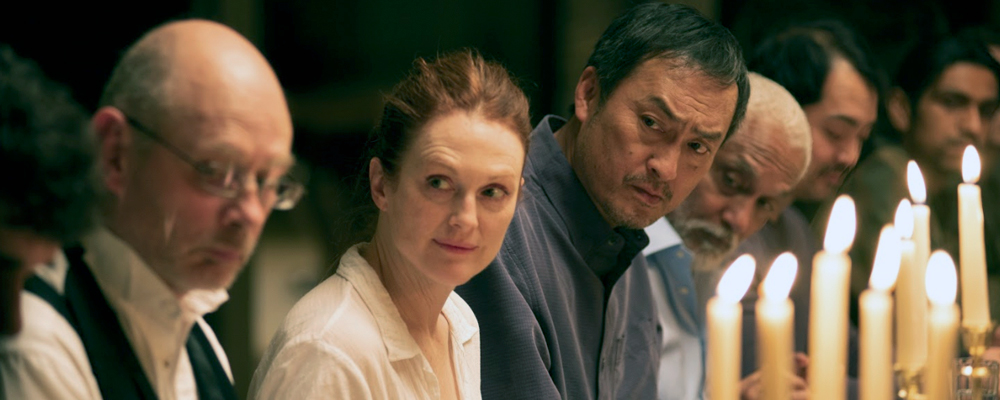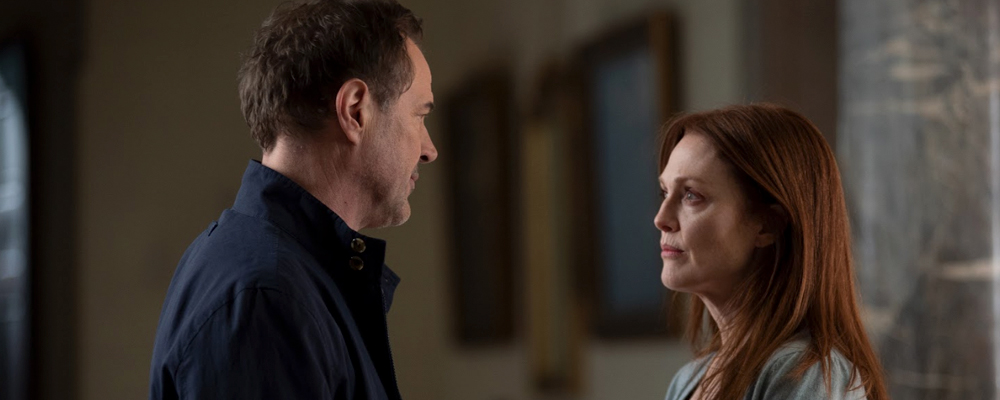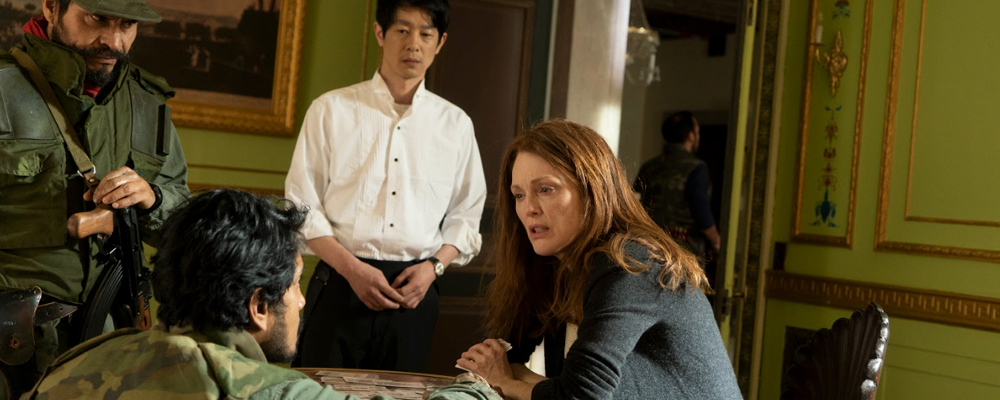Julianne Moore Sings for Her Life and Her Love in Paul Weitz’s ‘Bel Canto’
Michael Amundsen
In Paul Weitz’s new film “Bel Canto,” world famous opera star Roxanne Coss (Julianne Moore) agrees to sing at a private party in a repressive South American nation. But it’s her last time. No more performing for global capitalists, diplomats and leaders of third world countries. From now on only London, Italy or New York will be worthy of her attention.
Enter gun-toting insurgents. They take all the guests, including Ms. Coss, hostage. And just like that, Coss’ plans are on hold, maybe indefinitely.
“Bel Canto” is the latest film from noted director Paul Weitz, whose past credits include “About a Boy,” “Mozart in the Jungle” and the archetypal “American Pie.” Recently, Entertainment Voice had the pleasure to sit down with Weitz and discuss the mix of world cultures and local violence in “Bel Canto.”
“It was weird to be directing actors who spoke in so many different languages. … My favorite thing was not having people magically speak English, trusting that the story would come across regardless.”
Based on the novel of the same name by Ann Patchett, “Bel Canto” was also influenced by the Japanese embassy hostage crisis that took place in Lima, Peru in 1996.
In the film, hostages from all over the world are thrown together with local insurgents for many months as the Red Cross tries to negotiate an end to the standoff. Relationships between captors and captives grow, primarily the romance of Coss and prominent Japanese businessman Katsumi Hosokawa (Ken Watanabe). Hosokawa has traveled the world attending Coss’s recitals and operas, such is his passion for her genius. With this private affair, he hoped to meet her face to face.
In a supporting plot, Hosokawa’s translator Gen (Ryo Kase) falls in love with an indigenous woman named Carmen (María Mercedes Coroy). As with both couples, neither speaks the other’s language.
“It’s a pretty crazy story growing up with a grandmother from Oaxaca, Mexico and a grandfather from what is now the Czech Republic,” Weitz said referring to his grandparents Lupita Tovar and Paul Kohner who fell in love on the set of Universal Studio’s Spanish version of “Dracula” (1931). “It probably informed what I did on this film. Also that weird thing of knowing that when they met, they didn’t speak the same language.”
“I made the decision with Carmen (the young revolutionary) not to cast a really famous Spanish-speaking actress, but to cast someone like María. She had only done one film and that was in her native language of Quechua (Incan). The character in the book is trying to learn to read Spanish and in order to be true to it, I needed someone for whom Spanish was not their first language.”
“There were people of completely different worlds acting off of each other.”
“When Julianne Moore learns that the Ken Watanabe character has followed her all over the world to hear her sing, she says that he must love opera. And the Watanabe character says through his translator Gen, ‘her voice is opera.’ Ken (Watanabe) asked if he could say that. That’s very different than how I would write something. It’s a lovely way of putting it that clearly shows the way his brain works.”
Directing “Bel Canto” gave Weitz hard challenges and still a lot of pleasure.
“I think that for me the joy of directing is understanding what I don’t understand. Like in ‘About a Boy,’ how do I know more about an eleven year old British kid than the actor? And most recently like in “Grandma,” Lily Tomlin’s character is lesbian and has gone through decades of history. And Lily knew a lot more about that than I did. I write. I try to channel it, but at the same time I want the actor to know a lot more than I do.”
The subject then turned to the music aspect of “Bel Canto” and the dramatic power of opera.
“In opera, you’re talking about the most important questions humanity faces in a very direct way that would normally make one crazy, which I think the movie is also trying to do. Its other worldly story does seem to function like the plot of an opera.”
Renée Fleming, a prominent opera star in real life, came aboard as advisor and Moore’s actual operatic voice.
“Fleming provided her voice but also taught Julie (Moore) what it was like to be an opera singer. But in this case an American one and a prominent one. Gerald Martin Moore who was Renée’s accompanist also helped. So every time Julie was singing in the movie, Gerald was there with his face against the monitor making sure she was breathing in all the right spots and her physicality was proper.”
The movie has a lyrical beauty about it tied to the music and the flowing camera. It is both a dreamlike affair that contrasts brutally with the harsh reality of generals and military and guns that waits outside the mansion. The excellent performances of Moore, Watanabe, Coyor, and Kase support that feel of romance and fantasy. They are ably supported by Eddie Martinez as the leader as the leader of the guerillas, Christopher Lambert as a fellow hostage and most wonderfully Sebastian Koch as the Red Cross intermediary Messner.
To sum up what drives him when he makes movies, Weitz is very clear.
“Honestly, it’s the winter inside your soul. If that sounds like a silly thing to say about something like “American Pie”, those are people trying to figure out what it means to be human. Not just how to lose your virginity but how to do it so you do not lose your humanity.”
“In ‘Bel Canto,’ there are all these boundaries of language and social position and then in this case there is violent danger, but there is something that is shared. So it’s how you deal with that and what you make out of it.”
“Bel Canto” opens Sept. 14 in theaters nationwide.




